Inside this Article


Constant Contact is now only $20.00 per month!
Sign up for an annual plan and enjoy the savings.
90 users used this coupon!
Features
Limitations Hurt Both Services, but Constant Contact Offers More
The first thing an email campaign needs is, well, an email. Constant Contact offers over 300 email templates, which is a pretty impressive collection. I found some designs outdated, but there are enough options to make up for the weaker templates.
This also vastly outnumbers ConvertKit’s measly 9 templates, all of which are pretty meh.
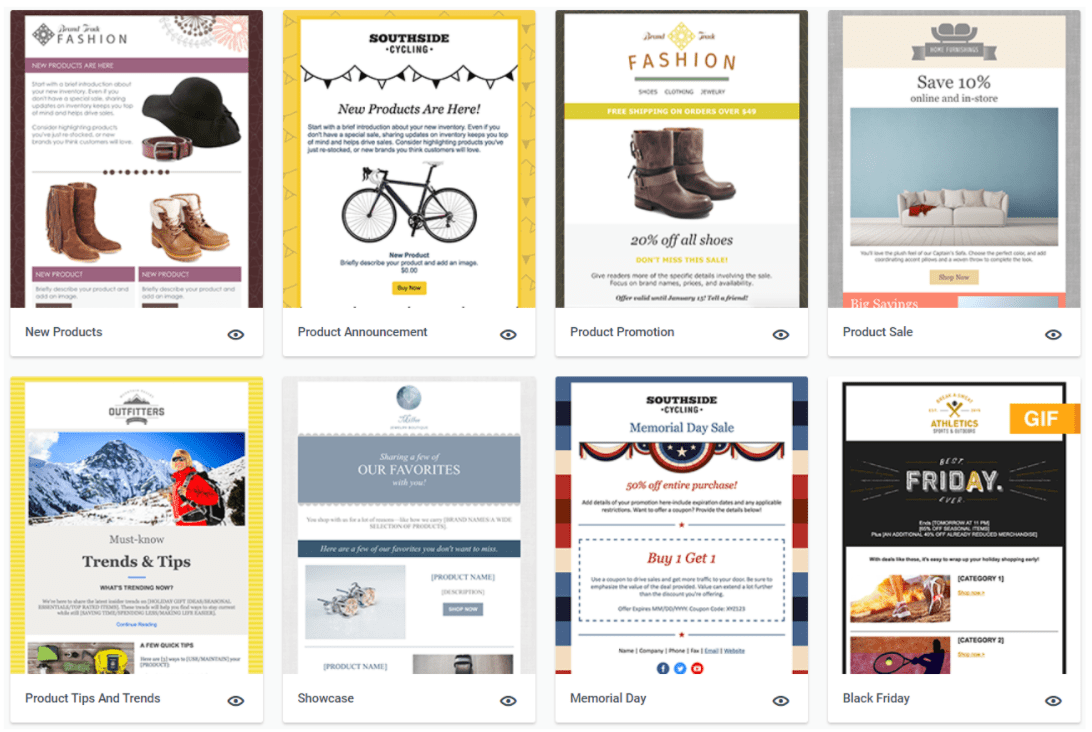
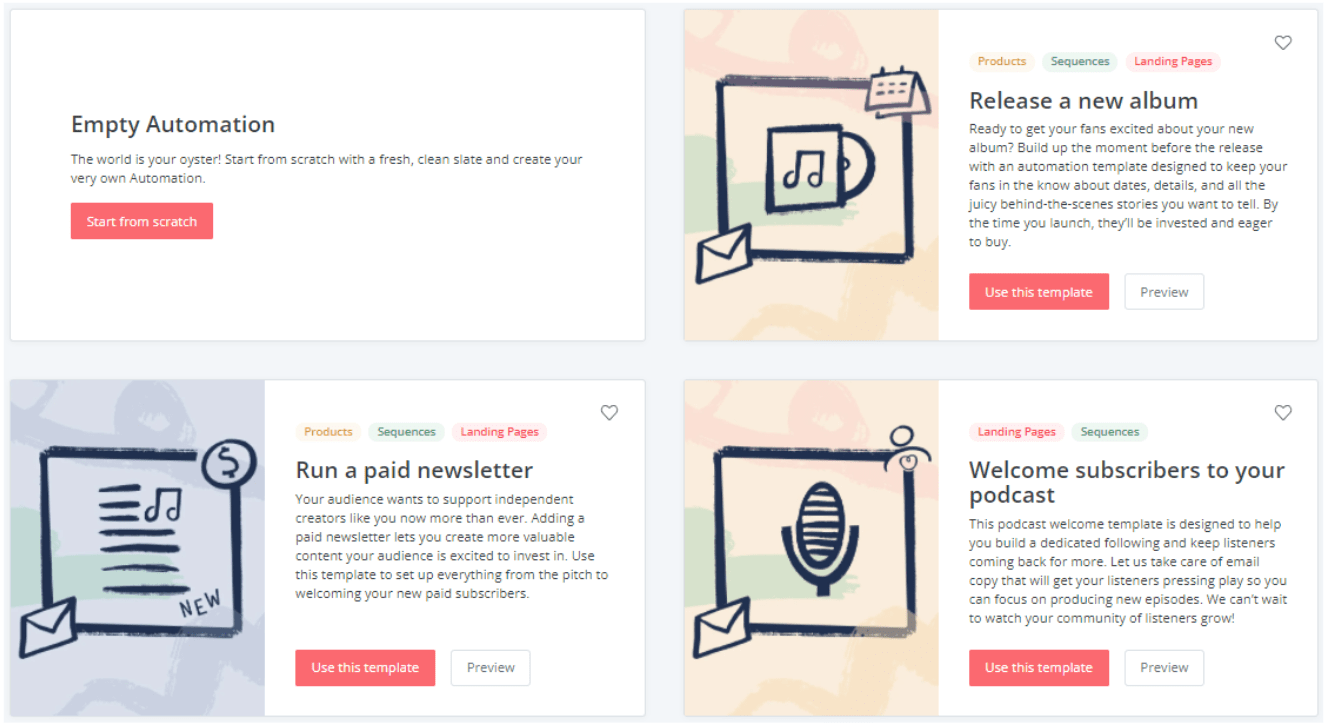
Ease of Use
Constant Contact Makes Sending Emails a Breeze
Constant Contact and ConvertKit are fairly easy for beginners to figure out. The interfaces are easy to navigate, using the drag-and-drop editors is a breeze, and there’s plenty of documentation to guide you when you need it. First, I took a look at the email editors Constant Contact and ConvertKit offer. Constant Contact has a simple drag and drop editor that allows for a fair bit of customization. In addition to the email editor, Constant Contact gives you tools to quickly build landing pages, sign-up forms, and online stores. Since Constant Contact is partnered with Shutterstock, you can access millions of royalty-free images.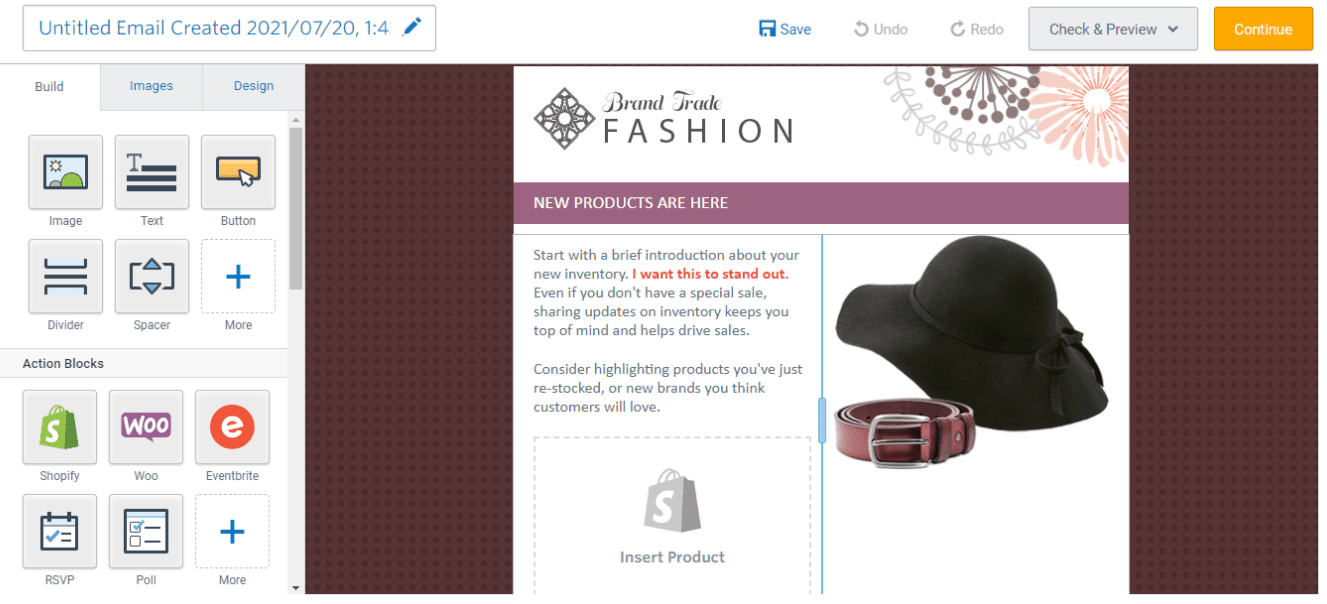
Deliverability
Constant Contact’s Strong Anti-Spam Policy Puts It Ahead
If anyone tries to sell you a line promising “85% email delivery!”, don’t listen. There’s no accurate way to pinpoint exact percentages like that. We’ve put together an in-depth guide on how to really boost your deliverability, as well tips to boost your rates. In short, it’s better to focus on the concrete things that we know affect deliverability: anti-spam policy, affiliate marketing policy, domain authentication, and dedicated IP availability. So, how does it compare when we look at ConvertKit vs Constant Contact? ConvertKit has a simple anti-spam policy. If you spam, you’re banned. Straightforward, sure, but I prefer Constant Contact’s more specific approach. If over 0.1% of your emails get marked as spam, Constant Contact freezes your account and puts it under review. This kind of policy makes me feel a lot more comfortable than ConvertKit’s wait-and-see approach.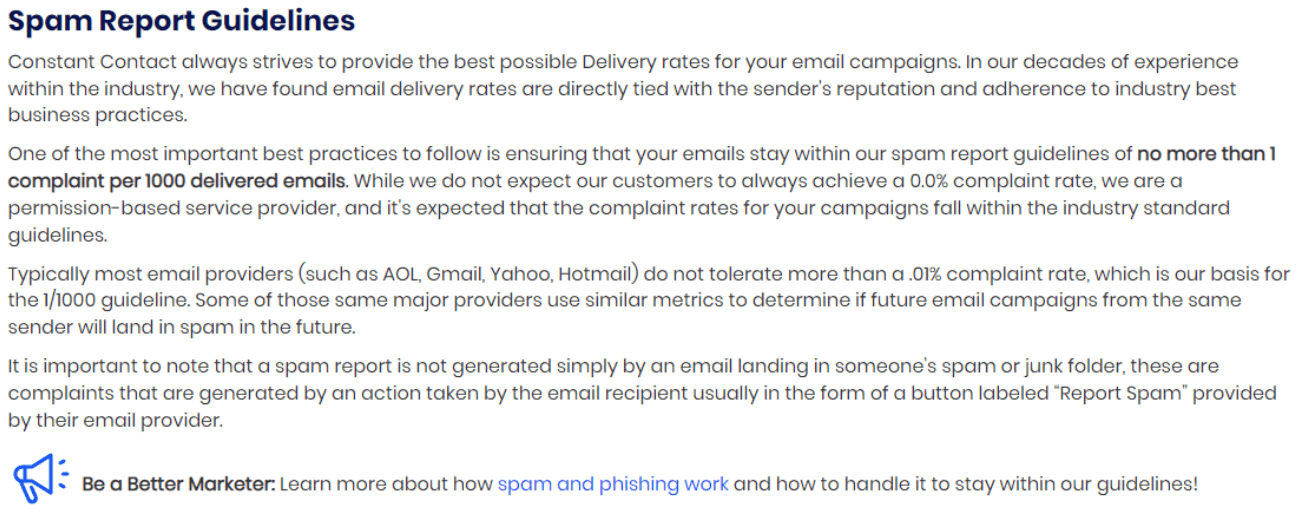
Reporting and Analytics
Lackluster Reports Leave Much To Be Desired
Good reporting can make or break your marketing campaign. Unfortunately, I wasn’t impressed with either Constant Contact or ConvertKit’s analytics. First off, Constant Contact’s reports are all but useless. These give you data on open rates, click rates, and what devices people were using. And that’s it. No heatmaps, no geographical data, no information on time, no knowledge of which platform or email client the user was on… Nothing that can actually help you improve your campaign. So how about ConvertKit? Unfortunately, if you’re on the free plan you only get reports on sign-up forms and unsubs. You have to pay for the Creator Pro plan to get advanced reporting if you want to track user engagement, clicks, and overall email deliverability. Which, spoiler alert, you should want to.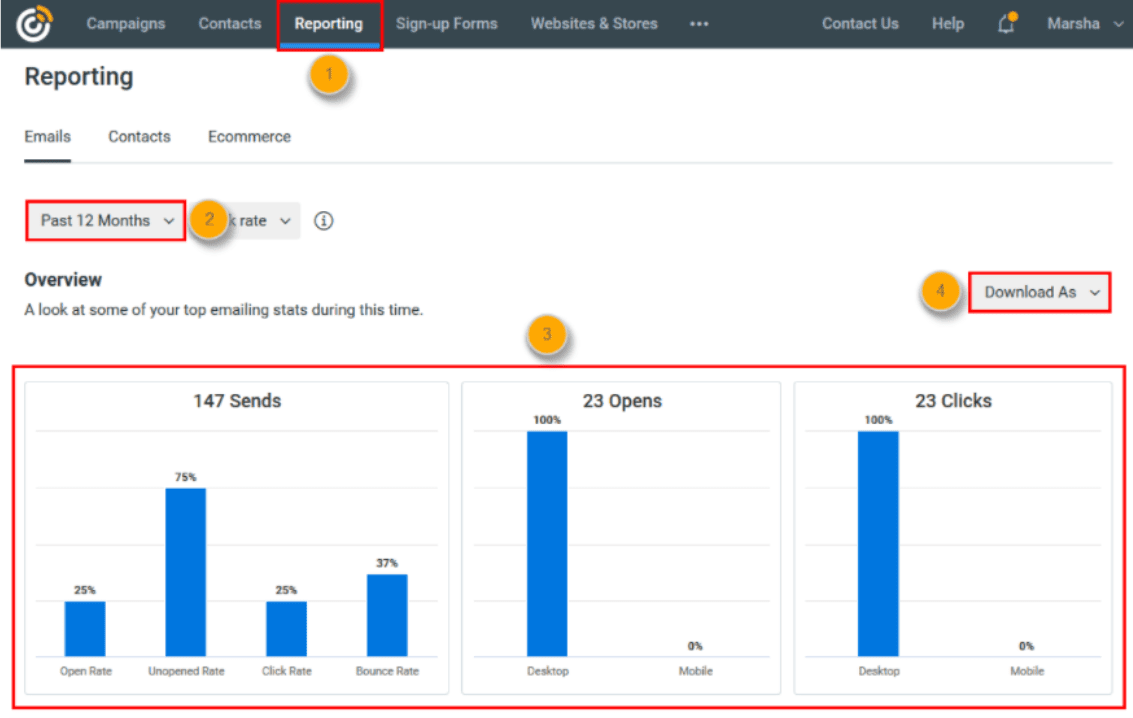
Pricing
Constant Contact Wins – Just – For Better Features on Its Paid Plan
To be honest, neither ConvertKit nor Constant Contact offer the best prices for what you get. Unlike ConvertKit, Constant Contact doesn’t have a free plan at all. You have to pick between its Core plan starting at $12.00 per month or its Email Plus plan starting at $35.00 per month. But on the other hand, when it comes to paid plans, Constant Contact offers more for your money. ConvertKit’s prices are comparable – the Creator plan starts at $29.00 per month, and the Creator Pro plan at $59.00 per month – but you get far fewer features.Here’s What You Get for Free
Constant Contact doesn’t offer a free plan, although you can check it out using the 30-day free trial when you first sign up. If you’re in the US, you get a 60-day free trial, which is the longest trial period I’ve seen from any EMS. But that’s where the freebies end. ConvertKit has a decent free plan. You don’t have a limit on email sends, which is great if you’re expecting to send a lot. Your number of contacts is restricted to 1,000, which is double the usual 500 I see with most free plans. A pretty great choice if you need the basics – but you’ll have to pay to get handy features like automation and reporting.Here’s What You Get If You Pay
ConvertKit has slightly cheaper starting prices, but I still feel the Creator Pro plan is too expensive for the features you get. You get “advanced reporting” (which isn’t even advanced), subscriber scoring, and the newsletter referral feature. Constant Contact’s Email plan gets you pretty much everything you need to run a successful campaign. But there’s a few things missing, like surveys and new sign-up automations – which you’ll have to pay significantly more to unlock with the Email Plus plan. It still doesn’t feel like the best value given that some very crucial features are missing, but for me, this is enough for Constant Contact to win this round – just. To help you decide which plan is best for your budget, check out this comparison of Constant Contact and ConvertKit’s two most similar plans.| ConvertKit Creator plan | Constant Contact Core plan | |
|---|---|---|
| Starting Price | $29.00 | $12.00 |
| Automation | Yes | Partial |
| Segmentation | Yes | Yes |
| A/B Testing | Subject line testing | Subject line testing |
| Native Marketing CRM | No | No |
| Landing Page Builder | Yes | Yes |
| Support | Live chat and email | Live chat, phone support, and email |
Support
ConvertKit Has Imperfect Yet Slightly Better Support
Constant Contact has phone support and a live chat available Monday through Thursday, 3 a.m. to 10 p.m., and on Fridays from 3 a.m. to 9 p.m. (ET). However, I couldn’t get live chat to work. This could have been a one-off issue – my colleague praised the live chat support in his Constant Contact review. But when I tested it, clicking on the live chat option did nothing. Not such a constant contact, eh? (Sorry, I’ll stop.) I did get in touch with an agent over the phone. The support agent picked up immediately and was able to answer my questions about importing my mailing list in a friendly manner. ConvertKit support was kind of hard to find. It offers live chat and email support, but no phone support. I went the email route.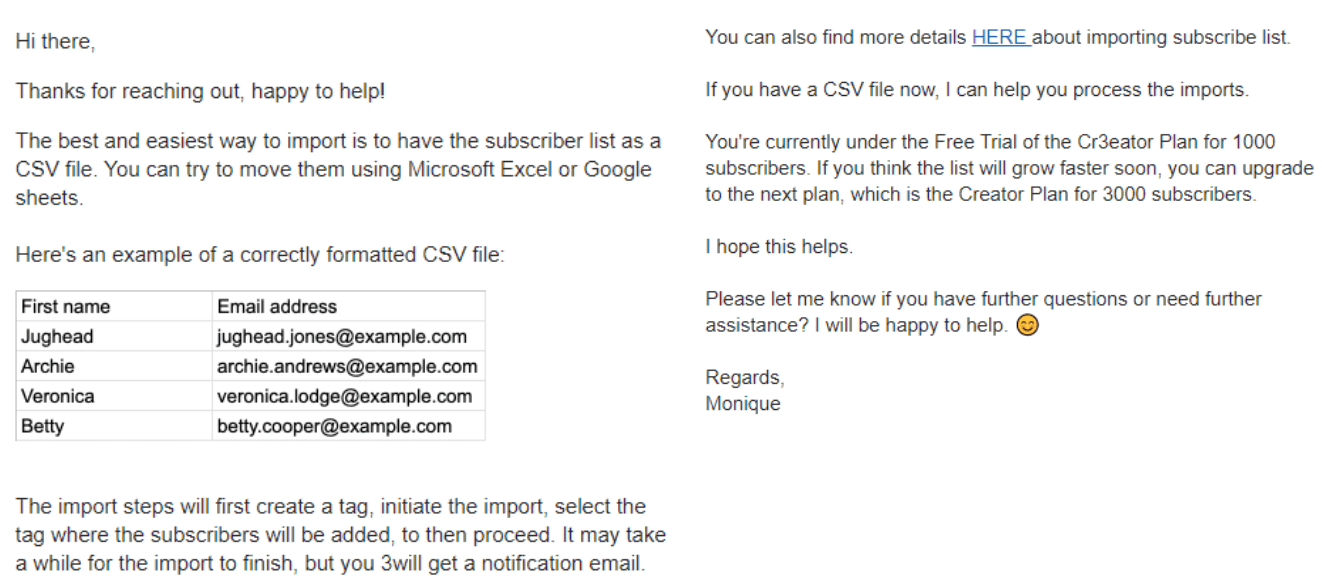
Constant Contact Is Overall Better Than ConvertKit
Overall, I’d recommend Constant Contact over ConvertKit for its ease of use, better deliverability, and wider range of features for the price. Based on my experience, you’ll get a better experience with Constant Contact. But honestly, I wasn’t blown away by either Constant Contact or ConvertKit. It’s frustrating – I feel if I could mash the best parts of each, I’d get a great service! As mentioned earlier, Constant Contact has a few significant drawbacks. If you intend to engage in complex automation sequences and plan to regularly analyze your campaigns, opting for an alternative EMS is advisable. For me, that’s got to be ActiveCampaign. As well as offering some of the most advanced automation and reporting that’s out there, ActiveCampaign is a solid all-rounder that we consistently rank as the best EMS currently available. Want a quick overview of everything I’ve discussed above? Take a look at the comparison of the features you get with Constant Contact vs ConvertKit, which lays out why I think Constant Contact is slightly better:ConvertKit
Constant Contact
Templates
9 templates
300+ templates with clean and simple designs
Automation
Yes
Yes, but severely limited
Native SMS Automation
No
Yes
Apps and Integrations
Over 3,000 apps through Zapier
Over 3,000 apps through Zapier
Landing Page Builder
Layout limited to the template you select
You can easily create a landing page in minutes
A/B Testing
You can only split test subject lines
You can only split test subject lines
Unique Features
Newsletter referral system
Event manager, online store builder, and EXTexting
Ease of Use
Can be tricky to navigate and find everything
Very easy to use and beginner friendly
Deliverability
Less than ideal anti-spam policy
Strict, hands-on anti-spam team
Reporting and Analytics
Limited reporting hidden behind a paywall
Limited reporting, but included in the cheapest plan
Pricing
Free plan, or paid plan starting at $29.00
No free plan, or paid plan starting at $12.00
Support
Email support and live chat
Live chat and phone support
Total Rounds Won
3
7


![ActiveCampaign vs ConvertKit: There’s Only One Option [2025]](https://dt2sdf0db8zob.cloudfront.net/wp-content/uploads/2022/01/Sendinblue-vs-Mailchimp-850x435.jpg)
![ActiveCampaign vs ConvertKit: There’s Only One Option [2025]](https://dt2sdf0db8zob.cloudfront.net/wp-content/uploads/2021/06/Alexandros-Melidoniotis-Writer-and-Editor-at-Website-Planet-150x150.png)





![10 Best Email Marketing Software for Ecommerce [2025 Update]](https://dt2sdf0db8zob.cloudfront.net/wp-content/uploads/2023/08/Best-Email-Marketing-Software-for-Ecommerce-850x446.jpg)
![Keap vs Mailchimp: Which Offers Better Value? [2025 Update]](https://dt2sdf0db8zob.cloudfront.net/wp-content/uploads/2023/06/Keap-vs-Mailchimp-850x446.jpg)
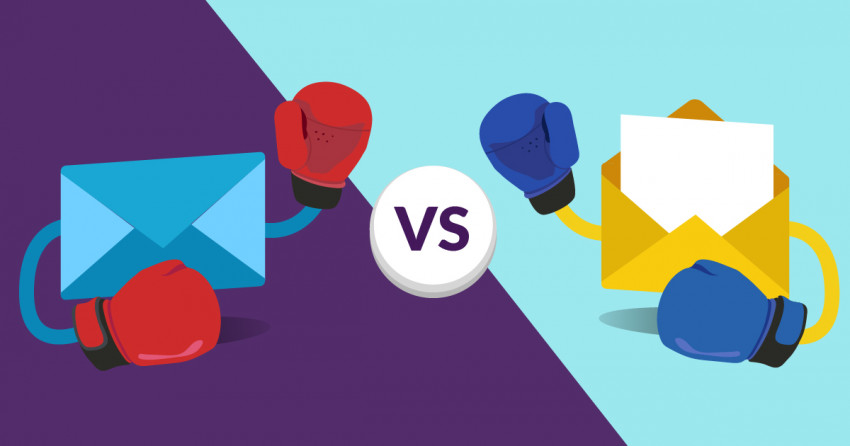
![Drip vs Mailchimp: Read Our Advice Before You Sign Up [2025]](https://dt2sdf0db8zob.cloudfront.net/wp-content/uploads/2022/10/Vs-1-850x446.jpg)
![MailerLite vs ConvertKit: Read This Before You Sign Up [2025]](https://dt2sdf0db8zob.cloudfront.net/wp-content/uploads/2022/10/Vs-850x446.jpg)


